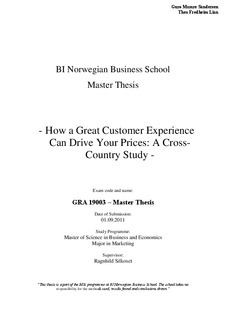| dc.description.abstract | Over the past couple of years, practitioners and marketing researchers have begun to discuss the concept ―customer experience. Pine and Gilmore (1999) state that there has been a shift in the marketing literature and that companies have moved from offering commodities to staging experiences. This master thesis seeks to answer the question how can companies charge a premium price on their service offer in the experience economy? The link between premium price and customer experiences has been argued by practitioners to be of importance, but there is still need for empirical research on this topic. Further, we seek to address the ambiguity in the marketing literature by offering an extended version of Vargo and Lusch‘s (2004) classification of schools of thought in the marketing literature. We argue that the recent waves in the marketing literature are characterized by a development from services marketing, to relationship marketing, and that the shift in the literature is evolving towards focusing on customer experiences. We identify that when researchers initially spoke of search, experience and credence goods or services, we now see that all service offerings have these attributes, and that the offers in the economy today can be seen as ―product plus. We believe that customer experiences will become increasingly important in the marketing literature. Based on a qualitative analysis conducted by Lemke, Wilson et al. (2006) we conducted a quantitative analysis identifying which factors are important to business-to-business customers when evaluating a positive customer experience and whether there is a connection between customer experience and premium price. The main findings include that trust and competence has an effect on customer experience, and that customer experience has an effect on premium price. Further, we identify that flexibility is important for the price charged, and not for the overall customer experience.
The main managerial contribution of this master thesis is related to the fact that customer experiences influence premium price. Hence, it could be valuable to companies to facilitate their customer experiences by focusing on the customer touch points in order to achieve a customer lock-on effect. This could have potential benefits in terms of higher revenues, reduced costs and competitive advantage. Further, flexibility also has an effect on the price charged, which gives guidelines as to how a company can increase its value. By investing in a flexible service offer, being adaptive to changes in customer needs and maintaining an overall positive customer experience is in this thesis shown to yield a premium price. Further, since trust has been found to have a positive effect on customer experiences, putting effort in building trust in the customer-company relationship could be beneficial. Limitations and directions for future research will be discussed. | no_NO |
